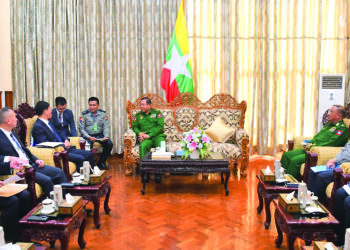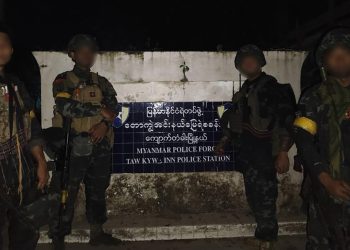Ye Ni: Welcome to Dateline Irrawaddy. This week, we’ll discuss the current talk of the town—the arrest of U Phyo Ko Ko Tint San who was found with firearms and illegal drugs at Naypyitaw Airport. Lawyer U Than Zaw Aung and The Irrawaddy Burmese editor U Yan Paing join me to discuss this. I’m Irrawaddy Burmese editor Ye Ni.
As you know U Phyo Ko Ko Tint San, the son of former sports minister U Tint San, was recently arrested at Naypyitaw Airport for illegal possession of firearms and drugs. Police also discovered guns at his ACE Hotel. And again, guns, accessories and things believed to be drugs paraphernalia were also discovered at his hotel and company headquarters in Thaketa and Bahan townships in Yangon. Police have charged him for drugs and illegal possession of firearms. Ko Than Zaw Aung, how do you assess this case?
https://www.facebook.com/theirrawaddyburmese/videos/1791721347538676/
Than Zaw Aung: Guns were seized from him before he boarded a plane in Naypyitaw. Further investigation led to the seizure of more guns at his house and hotel in Yangon. So, why does he keep firearms? Police have stated that he was preparing to establish a security company. The name of the company is interesting. Words such as ‘special force’, ‘national security council’ are interesting. We should ask if a private security company is allowed to use the terms such as ‘national’ and ‘council.’ Again, ‘special force’ is a term normally used by armed organizations, and authorities should carefully investigate the reasons behind it. Law enforcement personnel should efficiently handle the case and find out his intention.
YN: Do the charges brought by the police against them match the crime or do you see any suspicious aspects of the case? Because netizens have speculated that the case is politically motivated and there is a mastermind behind.
TZA: There will be a lot of speculation and wild guesses on social media. But, the responsibility lies on the Ministry of Home Affairs to investigate. If the ministry alone is not enough, assistance should be sought from military agencies in the investigation process. Usually most of the [drug] cases pale into insignificance over time [after the initial drug bust]. And drug and weapons are like husband and wife, they come in pairs. At the moment, it is difficult to say the motive behind. There are speculations, but it is the responsibility of the concerned authorities to investigate.
YN: What Ko Than Zaw Aung pointed out is interesting. Speaking of illegal arms, U Ko Ni’s assassination, which happened not long ago, involves illegal arms. The gun used in assassination was reportedly brought through the Thailand-Myanmar border. And there is another case in which a motorbike rider was killed by a bullet in Mandalay. No one knew what happened. But it is obvious that he was shot by someone. Ko Yan Paing, do you think police are working hard enough to investigate drug and illegal firearms cases?
Yan Paing: Rather than discussing if the police are working, what I’d like to know, as a journalist, is about the routes through which firearms are brought in. Police must investigate those routes and the arms dealers. And the case of the death of a motorbike rider in Mandalay is minor compared to the big haul of firearms in Naypyitaw—the first of its kind there. Not long ago, firearms were seized reportedly from a vehicle in Thazi Township [in Mandalay], and there are many firearms in border areas. I think those cases are concerned with arms smuggling. But the case in discussion is different; many firearms were seized in a place like Naypyitaw, and in a place like Yangon, guns like the M16 were discovered—it is a serious weapon. And as U Than Zaw Aung has pointed out, guns and drugs come in pairs. If he is high on drugs and shoots at something with those guns, it is very dangerous. So, I think police should give greater attention than they did in previous cases.
YN: Drugs and weapons usually come in pairs, but the amount of drug seized from him and discovered during police search [of his house and hotel] is not much. So, it can be concluded that he is just a drug user [as opposed to a dealer]. But talking of firearms, police stated that he was planning to establish a security company. As far as I’m concerned, there is still no law that allows for [armed] security service. But what I’d like to know is if the laws allow civilians to keep firearms, or specify the circumstances in which civilians can keep specific types of firearms. As far as I’m concerned, gun licenses were issued under the government of the Burma Socialist Programme Party (BPSS).
TZA: There were gun licenses issued under the BSPP government starting from 1977 but only to those who were fully-fledged party members and serving on duty in BSPP. They were allowed to keep three weapons including handguns, such as non-military rifles. But after the 1988 pro-democracy uprising, [the military] revoked gun licenses and recalled guns. There are three existing laws in Myanmar regarding weapons—the Arms Act 1878, which is an Indian act, the Arms Act (Temporary Amendment) 1951, and the Arms Emergency Punishment Temporary Act 1949. According to these existing laws, ordinary citizens are not allowed to keep firearms. Lawmakers asked about the keeping of firearms at the parliament probably under the previous government. At that time concerned officials replied that ordinary citizens are not allowed to keep firearms. Security guards of security companies are allowed to use handcuffs and rubber batons. They are not allowed to keep guns.
YP: Besides what Ko Than Zaw Aung has said, as you see police usually carry out checks on ordinary citizens who go out late at night by car or motorbike, and even seize swords and sticks from them if they carry any. Therefore, I think the case is more than establishing a security company or a hobby.
YN: This seizure of guns, camouflage jackets and military accessories reminds me of the previous case of such a seizure in the alleged plot of U Aye Ne Win and U Kyaw Ne Win for high treason. And this case has aroused concerns. And there are concerns for the security of State Counselor Daw Aung San Suu Kyi. Talking of illegal possession of arms, there are armed groups in our country in ethnic regions. After they held peace talks [with the government], their members were allowed to come into [government-controlled] towns with guns for a certain period of time though carrying guns in towns is totally banned now. However, the case proves again the speculation that guns are still brought into towns by one way or another. Ko Than Zaw Aung, what measures do you think should be taken to control this?
TZA: As I have said, it is important to find out intentions in crimes. In the case we’re discussing, it is the accused who has to prove that he does not intend to commit high treason. The Arms Act (Temporary Amendment) stated that despite any contrary provision in any other existing laws, it shall be presumed that a person found to be in possession of arms has the intention of committing the offence of high treason. So in this case, the accused has to prove that he has no intention of committing high treason.
YN: What do you think, Ko Yan Paing?
YP: Mainly that the home affairs ministry should work harder, I think. Things are different from the past now. Nowadays, illegal arms will come into the country from various places—drug dealers, China border, Thai border. Recently, guns were discovered on the Thai border and I heard that police even seized air guns that use metal balls. But the question is if police can always do like that? As illegal arms have been found in Naypyitaw and Yangon, laws should be amended as necessary and the Ministry of Home Affairs should make greater efforts to gather intelligence and find out the network of accomplices.
YN: Thank you for your contribution!

















